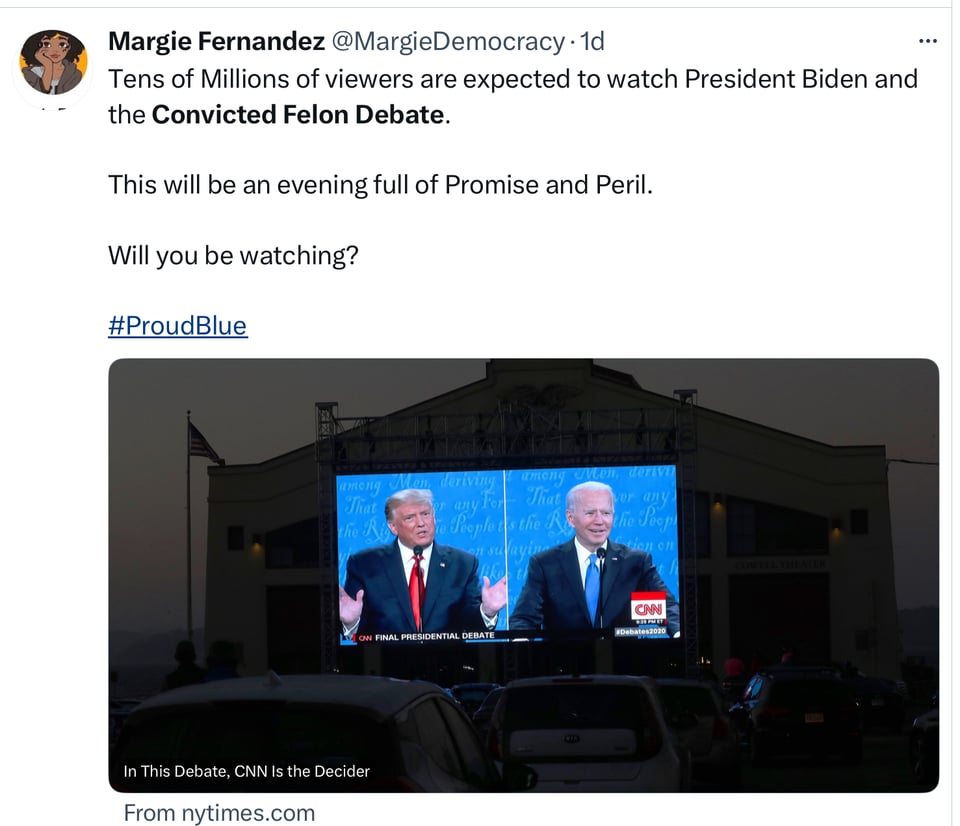Thursday, June 27, 2024. Annette’s News Roundup.
I think the Roundup makes people feel not so alone.
To read an article excerpted in this Roundup, click on its blue title. Each “blue” article is hyperlinked so you can read the whole article.
Please feel free to share.
Invite at least one other person to subscribe today! Here 👇 is the link to share for others to subscribe. https://buttondown.email/AnnettesNewsRoundup
Remember: when you share the Roundup, you are fighting Fascism and helping to bring about a Democratic victory in 2024.
Joe is always busy.
Biden Expected to Pardon Veterans Convicted of Having Gay Sex.

The president’s proclamation would grant clemency to around 2,000 people charged between 1951 and 2013 under a military code that outlawed the behavior.
“Today, I am righting an historic wrong by using my clemency authority to pardon many former service members who were convicted simply for being themselves,” Mr. Biden said in the statement. “Despite their courage and great sacrifice, thousands of L.G.B.T.Q.I.+ service members were forced out of the military because of their sexual orientation or gender identity. Some of these patriotic Americans were subject to court-martial, and have carried the burden of this great injustice for decades.”
The proclamation, which was reported earlier by CNN, addresses charges brought under Article 125 of the Uniform Code of Military Justice, a federal law that made it a crime to engage in “unnatural carnal copulation with another person of the same or opposite sex,” even with mutual consent. In 2013, Congress voted to repeal the portion of the code that outlawed consensual sodomy. (New York Times).
Yes, this happened.👇

— —
Biden extends solar opportunities to more Americans.
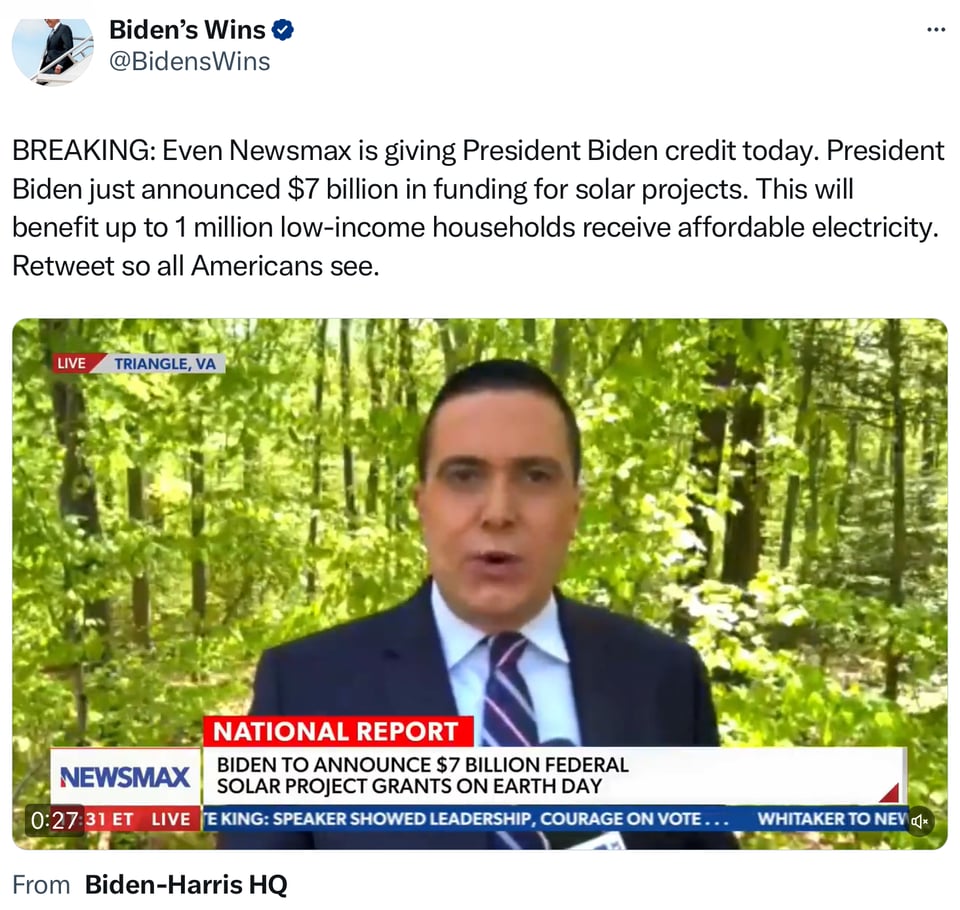
Biden to lower some drug costs through inflation penalties
The Biden administration said it will impose inflation penalties on 64 prescription drugs for the third quarter of this year, lowering costs for certain older Americans enrolled in Medicare. President Joe Biden has made lowering U.S. drug prices a key pillar of his health-care agenda and reelection platform for 2024. A provision of Biden’s Inflation Reduction Act requires drugmakers to pay rebates to Medicare if they hike the price of a medication faster than the rate of inflation.
The Biden administration on Wednesday said it will impose inflation penalties on 64 prescription drugs for the third quarter of this year, lowering costs for certain older Americans enrolled in Medicare.
President Joe Biden has made lowering U.S. drug prices a key pillar of his health-care agenda and reelection platform for 2024. A provision of Biden’s Inflation Reduction Act requires drugmakers to pay rebates to Medicare, the federal health program for Americans over age 65, if they hike the price of a medication faster than the rate of inflation.
It is separate from another provision under the law that allows Medicare to negotiate lower prescription drug prices with manufacturers. On average, Americans pay two to three times more than patients in other developed nations for prescription drugs, according to the Biden administration.
Some patients will pay a lower coinsurance rate for the 64 drugs covered under Wednesday’s announcement, which fall under Medicare Part B, for the period from July 1 to Sept. 30 “since each drug company raised prices faster than the rate of inflation,” according to a release from the administration.
Some Medicare Part B patients may save as much as $4,593 per day if they use those drugs during the quarter, the release added.
More than 750,000 Medicare patients use the drugs each year, according to the release. The medications treat conditions such as cancer, certain infections and a bone disease called osteoporosis.
The list includes Bristol Myers Squibb’s Abecma, a cell therapy for multiple myeloma; and Pfizer’s targeted cancer treatment for certain lymphomas called Adectris. It also includes Astellas Pharma and Pfizer’s Padcev, a targeted cancer treatment for advanced bladder cancer.
The Biden administration said Padcev’s price has increased faster than inflation every quarter since the Medicare inflation rebate program went into effect last year.
“Without the Inflation Reduction Act, seniors were completely exposed to Big Pharma’s price hikes. Not anymore,” Neera Tanden, White House domestic policy advisor, said in the release.
The Centers for Medicare & Medicaid Services plans to send the first invoices to drugmakers in 2025 for the rebates owed to the program.
In December, Biden released a list of 48 prescription drugs that would be subject to inflation penalties during the first quarter of 2024. (CNBC)
Former Congressman from Illinois, Adam Kinzinger, a Republican, spoke out for Joe.
Tonight, the Presidential Debate. 9:00 pm Eastern Time. CNN.
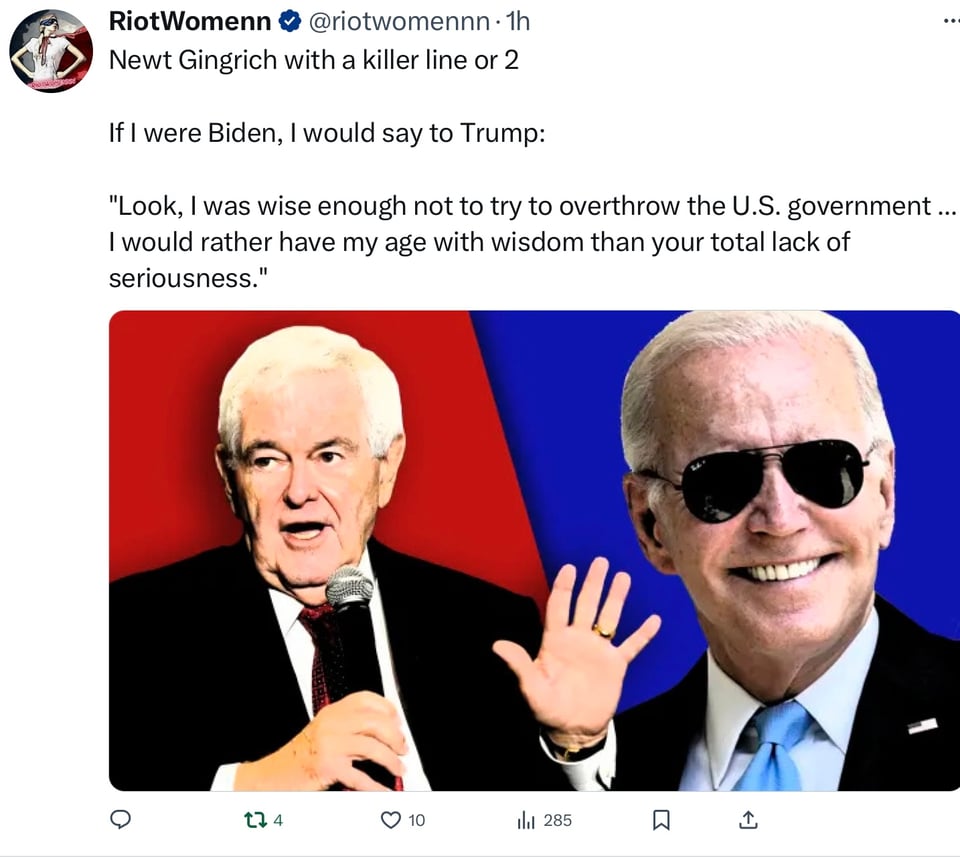

Jake Tapper and Dana Bash, moderators tonight.
Project 2025. The Heritage Foundation et al. Plan, should Trump return to the White House.
House Democrats warn of Project 2025 plans for a Trump White House | AP News
WASHINGTON (AP) — Warning about the far-right Project 2025 agenda for a Donald Trump White House, a group of House Democrats has launched a task force to start fighting the proposal and stop it from taking hold if the Republican former president returns to power.
Democratic Rep. Jared Huffman of California is unveiling The Stop Project 2025 Task Force on Tuesday, the latest sign that congressional Democrats and outside groups are treating Trump’s campaign seriously in the expected rematch against Democratic President Joe Biden this fall.
“The stakes just couldn’t be higher,” Huffman told The Associated Press.
Huffman said the Project 2025 agenda will hit “like a Blitzkrieg” and lawmakers need to be ready.
“If we’re trying to react to it and understand it in real time, it’s too late,” he said. “We need to see it coming well in advance and prepare ourselves accordingly.”
The Democratic-led task force comes as groups on and off Capitol Hill are increasingly alarmed over Project 2025, a sweeping blueprint from the conservative Heritage Foundation that is preparing to quickly help staff a new GOP administration with plans for dismantling aspects of the federal government and installing loyalists for a second Trump term.
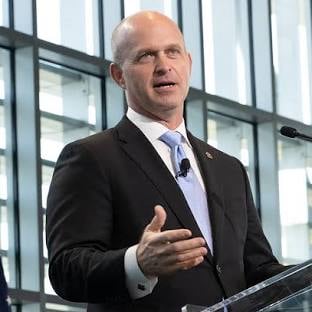
Kevin Roberts.
Kevin Roberts, the president of The Heritage Foundation and Heritage Action for America, scoffed at the “unserious” effort and said the left is “in a frenzy” as Project 2025 tries to wrest control of the federal bureaucracy. “Project 2025 will not be ‘stopped,’” Roberts said in a statement. He said the Democrats fighting Project 2025 are “more than welcome to try. We will not give up and we will win.”
While the Trump campaign has repeatedly said that outside groups do not speak for the former president, Project 2025’s 1,000-page proposal was drafted with input from a long list of former Trump administration officials who are poised to fill the top ranks of a potential new administration. (Associated Press)
The actual plan begins on page 33. Before that are credits for the more than more right wing organizations that contributed to the 2025 Plan.
This 👇 will give you a taste.

This is the whole plan. 👇
DeSantis makes life less in Florida.
DeSantis Vetoes All Arts Grants in Florida.
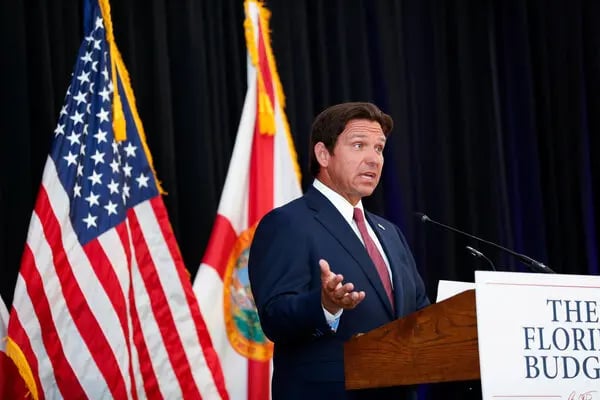
Gov. Ron DeSantis gave no explanation for zeroing out the $32 million in grants that were approved by state lawmakers.
For the past 10 days, Richard Russell has been rattled, poring over budgets and working the phones in an attempt to limit the consequences of Gov. Ron DeSantis’s veto pen.
Mr. Russell, the general director of the Sarasota Opera on Florida’s Gulf Coast, had expected his nonprofit organization to receive a state grant of about $70,000 once Mr. DeSantis signed a budget that state lawmakers had approved in March.
But in a move that stunned arts and culture organizations, Mr. DeSantis vetoed the entirety of their grant funding — about $32 million — on June 12, leaving them scrambling to figure out how to offset the shortfall.
“It’s not going to close us,” Mr. Russell said. “But it is a gap that I am going to have to figure out how to make up, and if I don’t find alternate sources of funding, that could be someone’s job.”
Leaders of arts organizations in Florida, many of whom have worked in the state for decades, cannot remember a governor ever eliminating all of their grant funding. Even in the lean years of the Great Recession, at least a nominal amount — say, 5 percent of the recommended total — was approved.
Established arts organizations usually know better than to overly rely on nonrecurring state dollars subject to the discretion of politicians, said Michael Tomor, executive director of the Tampa Museum of Art. But to cut funding at a time when arts organizations are still struggling to recover from the coronavirus pandemic sends a concerning message “that taxpayer dollars should not be used in support of arts and culture,” he added.
In reality, Dr. Tomor said, organizations like his are tourism and economic drivers that also provide a public good, especially for children, older people and underserved communities.
“We truly are learning institutions,” said Dr. Tomor, whose museum expected to receive a $500,000 capital grant and a $70,500 operational grant this year. “We fulfill an important role in our communities.”
Mr. DeSantis, a Republican, gave no explanation for zeroing out the arts grants. His office said in a statement that he made veto decisions “that are in the best interests of the State of Florida.”
In all, Mr. DeSantis vetoed nearly $950 million in proposed spending and proclaimed that the remaining $116.5 billion came in under the previous year’s budget.
“This is a budget that shows it can be done,” Mr. DeSantis said at a news conference.
Following the governor’s veto, the Florida Cultural Alliance, an advocacy organization for arts and culture groups, learned from its lobbyist that the administration might seek to revamp the process for awarding the grants, said Jennifer Jones, the alliance’s president and chief executive.
The current process requires organizations to submit annual applications for vetting to the state Division of Arts & Culture. For this year, the division recommended about $77 million in grants; after appropriations committee hearings, lawmakers included $32 million — $26 million in operational grants and $6 million in capital grants — in their budget.
“What’s interesting is that, just a couple of years ago, we had the highest ever funding for the arts in the state,” Ms. Jones said.
In retrospect, she and other arts leaders said, it seemed telling that Mr. DeSantis had not set aside a place-holder amount of funding for arts grants, as he had done in previous years, in his initial budget proposal in December.
But since lawmakers did include the money in the budget they approved in March, arts organizations thought that funds would ultimately come their way. It took Mr. DeSantis several months to formally receive, review and sign the budget, for the fiscal year that begins on July 1.
Funding for some cultural organizations did survive, as projects put forth by individual lawmakers. In the past, leaders of arts organizations have been discouraged from seeking those earmarks and encouraged to apply through the grant program instead, Mr. Russell, of the Sarasota Opera, said.
Many people have moved to Florida in recent years, and cities like Sarasota and St. Petersburg, also on the Gulf Coast, have promoted the arts as part of their identity, becoming destinations for those looking for a lively cultural scene.
Even small towns have benefited from having arts groups anchoring cultural programming, said Grace B. Robinson, executive director of the Gadsden Arts Center & Museum in Quincy, a city of about 8,000 in the rural Florida Panhandle.
“We attract people who improve residential and business properties — many of whom will only move to communities with quality art organizations,” she said. The center had expected to receive a $50,000 grant, which would have amounted to about 12 percent of its annual budget, she added.
After Mr. DeSantis’s veto, the Florida Cultural Alliance asked its members how the funding cuts would affect them. Out of 108 organizations that responded to the survey, 73 percent said they would make adjustments and continue with their existing plans.
But 41 percent said they would have to cancel public events, 35 percent said they would have to cut programming for children and 31 percent said they would have to reduce their staff. (New York Times).
Your Daily Reminder
Trump is a convicted felon.
On May 30th, he was found guilty on 34 felony counts by the unanimous vote of 12 ordinary citizens.
He will be sentenced on July 11th.
